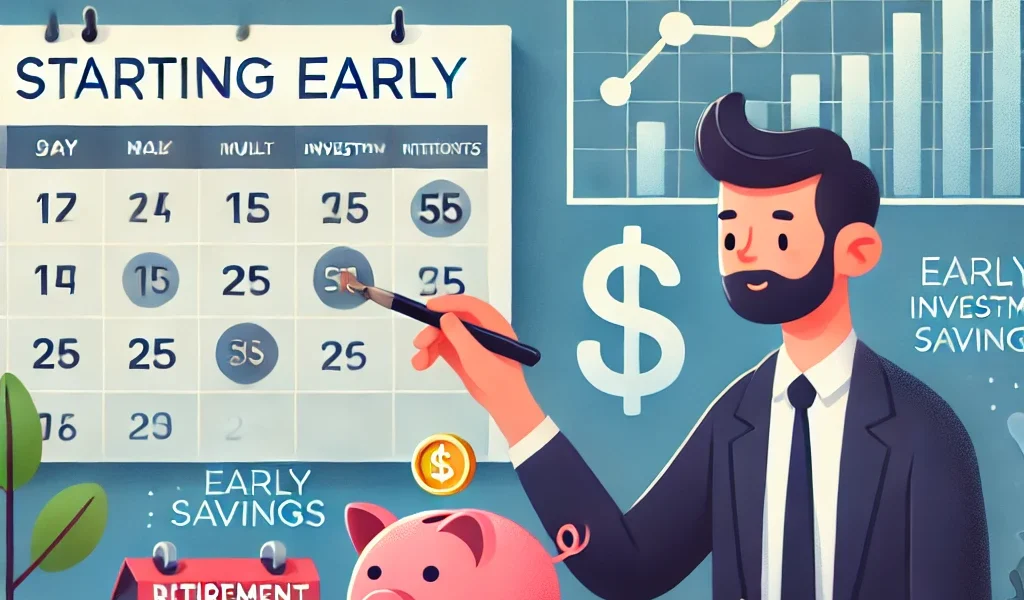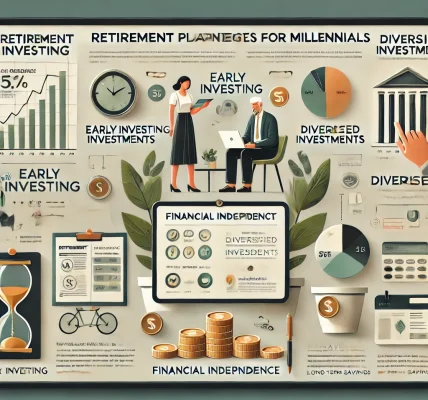Retirement planning is one of the most critical aspects of personal finance, yet many people delay it, believing they have plenty of time. The reality is that the earlier you start saving for retirement, the better your financial future will be.
In this comprehensive guide, we’ll explore why early retirement savings are essential, how compound interest works, and strategies to begin saving at different life stages. Whether you’re in your 20s, 30s, or 40s, it’s never too early—or too late—to start securing your financial future.
Why Should You Start Saving for Retirement Early?
1. Benefit from Compound Interest
One of the biggest advantages of starting early is compound interest, which allows your investments to grow exponentially over time. The earlier you start, the more time your money has to multiply.
For example:
- If you save $200 per month starting at age 25, assuming a 7% annual return, you’ll have $524,000 by age 65.
- If you start at age 35 with the same amount, you’ll only have $245,000 by age 65.
This demonstrates the power of time in the market rather than just timing the market.
2. Lower Financial Stress in the Future
- Starting early means you can contribute smaller amounts over time instead of scrambling to save large sums later.
- It reduces the risk of financial burden in your 50s and 60s, allowing for a comfortable retirement without last-minute panic.
3. More Investment Growth and Flexibility
- Early savers can take calculated risks with investments, such as stocks, which historically provide higher returns over the long term.
- You have more flexibility in adjusting contributions if needed, without jeopardizing your retirement goals.
How Much Should You Save for Retirement?
A common rule of thumb is the “15% Rule”, meaning you should aim to save at least 15% of your annual income for retirement. However, the exact amount depends on your lifestyle, retirement age, and income.
General Savings Benchmarks by Age:
| Age | Recommended Savings Multiple of Annual Salary |
|---|---|
| 30 | 1x your salary saved |
| 40 | 3x your salary saved |
| 50 | 6x your salary saved |
| 60 | 8-10x your salary saved |
If you start early, reaching these benchmarks becomes much easier.
When Should You Start Saving for Retirement?
1. Starting in Your 20s (Best Time!)
✅ Advantages:
- Maximum time for compound growth.
- Ability to take on higher-risk, higher-return investments.
- Develops good financial habits early.
🔹 How to Save:
- Enroll in an employer-sponsored 401(k) and contribute at least enough to get the company match.
- Open a Roth IRA to enjoy tax-free withdrawals in retirement.
- Set up automatic savings to ensure consistent contributions.
2. Starting in Your 30s (Still a Great Time!)
✅ Advantages:
- You still have 30+ years to grow your investments.
- You’re likely earning more than in your 20s, allowing for higher contributions.
🔹 How to Save:
- If you haven’t started, increase your 401(k) contributions to 15% of your income.
- If you have a Roth IRA, contribute the maximum amount allowed.
- Prioritize paying off high-interest debts while saving for retirement.
3. Starting in Your 40s (Not Too Late!)
✅ Advantages:
- You still have 20+ years to save.
- More career stability allows for catch-up contributions.
🔹 How to Save:
- Max out your 401(k) contributions ($23,000 in 2024, plus catch-up contributions of $7,500 if over 50).
- Consider more conservative investment options while still maintaining growth potential.
- Cut unnecessary expenses to boost savings.
Best Retirement Accounts to Consider
- 401(k) or 403(b) – Employer-sponsored plan with tax benefits.
- Roth IRA – Tax-free withdrawals in retirement.
- Traditional IRA – Tax-deductible contributions with tax-deferred growth.
- Health Savings Account (HSA) – Triple tax benefits for medical expenses and retirement healthcare.




